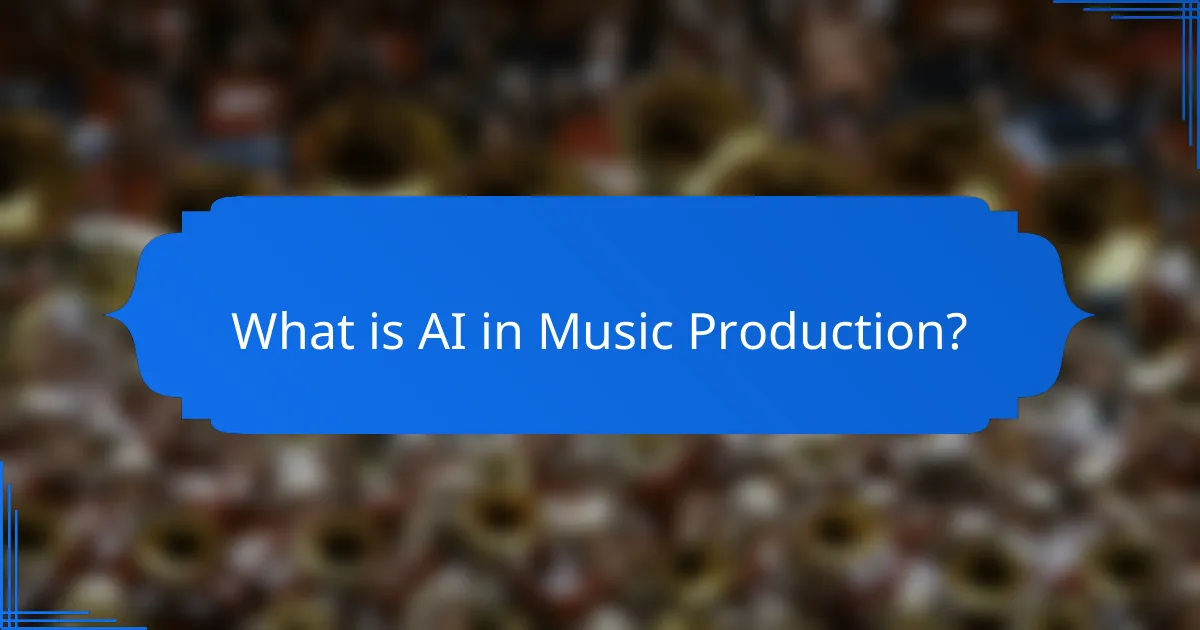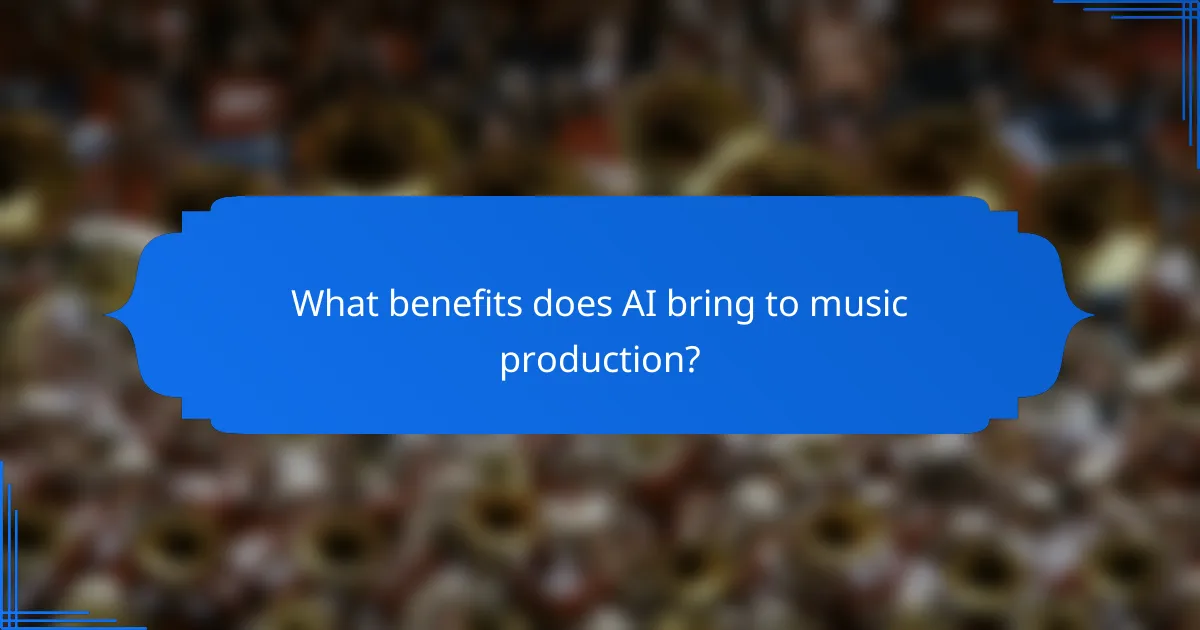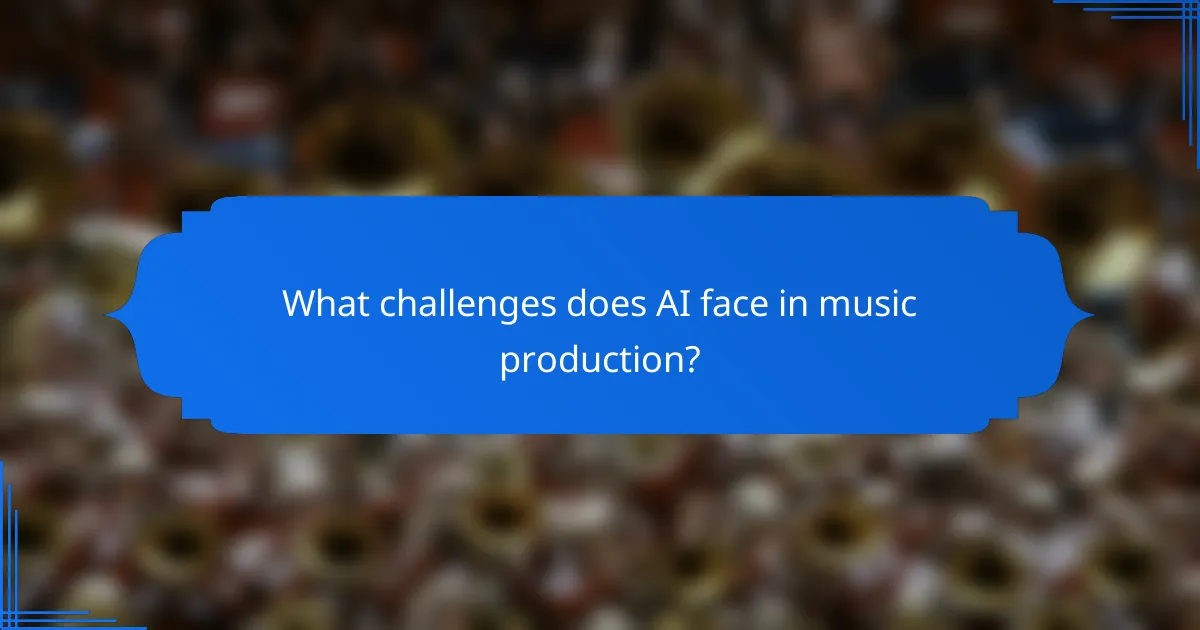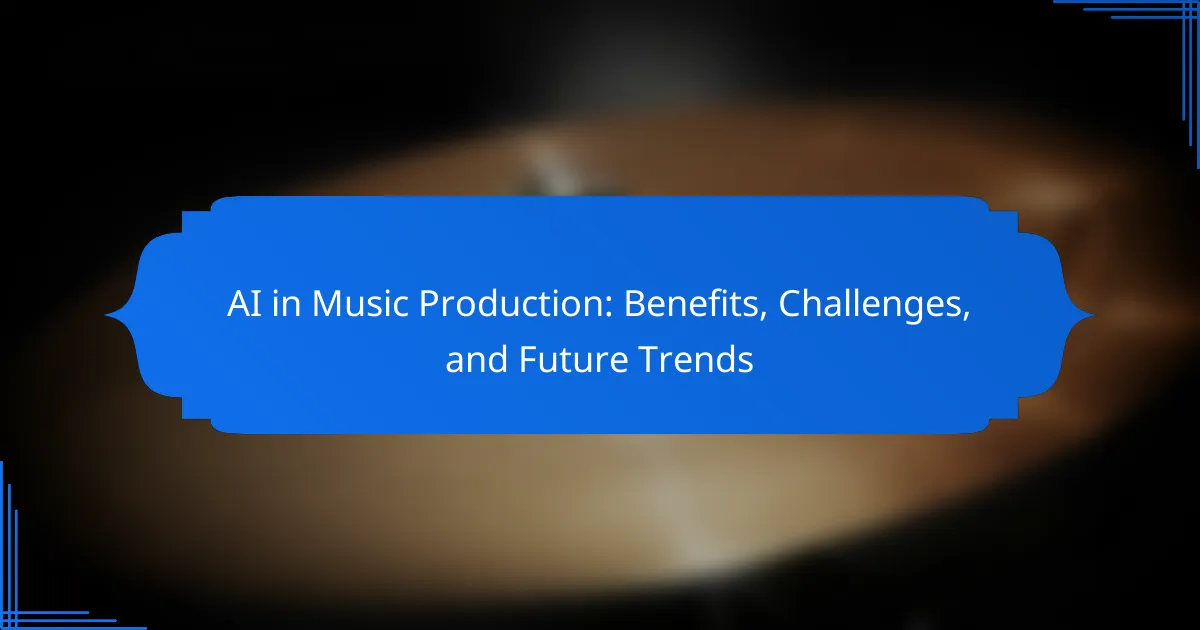AI in music production involves the application of artificial intelligence technologies to aid in the creation, composition, and production of music. This article explores the benefits of AI, including increased efficiency, enhanced creativity, and improved accessibility for artists. It highlights how AI tools can automate repetitive tasks, analyze data for trends, and assist in sound design. Additionally, the article addresses challenges such as the complexity of human emotion in music, originality concerns, technical limitations, and ethical issues related to copyright. Finally, it discusses the skepticism among traditional musicians regarding AI’s role in the creative process and its implications for the future of music production.

What is AI in Music Production?
AI in music production refers to the use of artificial intelligence technologies to assist in the creation, composition, and production of music. These technologies can analyze vast amounts of data to generate melodies, harmonies, and rhythms. AI tools can also enhance sound quality and automate various production tasks. For instance, software like AIVA and Amper Music utilizes algorithms to compose original music tracks. Research shows that AI can reduce production time significantly, allowing artists to focus on creativity. Additionally, AI-driven tools can provide personalized recommendations, enhancing the overall music experience for both creators and listeners.
How does AI technology integrate into music production?
AI technology integrates into music production by automating tasks and enhancing creativity. AI algorithms analyze vast amounts of music data to identify patterns. These patterns assist in generating melodies, harmonies, and rhythms. AI tools can also provide real-time feedback during the mixing and mastering process. For instance, platforms like Amper Music and AIVA use AI to compose music based on user inputs. Additionally, AI can assist in sound design by creating new sounds and samples. Research shows that AI-generated music can evoke emotional responses similar to human-composed music. This integration streamlines workflows and opens new avenues for artistic expression.
What are the key AI tools used in music production?
Key AI tools used in music production include AIVA, Amper Music, and LANDR. AIVA is an AI composer that creates original music scores. It utilizes deep learning algorithms to analyze music patterns. Amper Music allows users to generate music tracks based on specific moods and styles. It simplifies the music creation process for content creators. LANDR offers AI-driven mastering services to enhance audio quality. It uses machine learning to analyze tracks and apply mastering techniques. Other tools include OpenAI’s MuseNet, which generates compositions in various genres. These tools demonstrate the integration of AI in enhancing creativity and efficiency in music production.
How do these tools enhance the creative process?
AI tools enhance the creative process in music production by automating repetitive tasks. This allows musicians to focus more on creativity and less on technical details. AI can generate unique sounds and compositions, providing fresh ideas for artists. Additionally, these tools analyze existing music to suggest improvements or variations. They also facilitate collaboration by enabling remote work among artists. Studies show that AI-generated music can inspire human composers, leading to innovative results. For example, OpenAI’s MuseNet can create original compositions across various genres. This demonstrates how AI tools can significantly boost creativity in music production.
What are the historical developments of AI in music production?
AI in music production has evolved significantly since its inception. In the 1950s, early experiments used algorithms to compose music. By the 1980s, AI systems like Experiments in Musical Intelligence began to generate melodies. The 1990s saw the introduction of machine learning techniques for analyzing musical patterns. In the 2000s, AI tools became more accessible for producers, integrating into digital audio workstations. Recent advancements include deep learning models that can create complex compositions. Notable examples include OpenAI’s MuseNet and Google’s Magenta project. These developments have transformed how music is created, allowing for innovative collaboration between humans and machines.
How has AI evolved in the music industry over the years?
AI has evolved significantly in the music industry over the years. Initially, AI’s role was limited to basic algorithmic composition in the 1980s. Early systems could generate simple melodies but lacked complexity. In the 1990s, advancements in machine learning allowed AI to analyze existing music patterns. This led to the development of software that could assist in music creation. By the 2000s, AI began to influence music production with tools for sound synthesis and mixing. Recent years have seen AI applications in music recommendation systems, enhancing user experience on streaming platforms. Notable examples include Spotify’s algorithms that curate personalized playlists. AI is now capable of composing entire songs, as demonstrated by projects like OpenAI’s MuseNet. The evolution of AI in music reflects a shift from simple tools to sophisticated systems that collaborate with artists.
What milestones mark the progress of AI in music production?
The progress of AI in music production is marked by several key milestones. In 1957, the first computer-generated music was created by Lejaren Hiller using the Illiac Suite. In the 1980s, MIDI technology allowed computers to interface with musical instruments, enhancing music creation. In 1997, IBM’s Deep Blue demonstrated AI’s potential by composing music, showcasing algorithmic composition. The 2010s saw the rise of machine learning, with tools like Google’s Magenta enabling creative collaboration. In 2016, Sony’s Flow Machines produced “Daddy’s Car,” a song created with AI assistance, highlighting AI’s role in songwriting. By 2020, AI-driven platforms like AIVA and Amper Music became commercially available, allowing users to generate original music effortlessly. Each of these milestones illustrates the evolving capabilities of AI in transforming music production.

What benefits does AI bring to music production?
AI enhances music production by improving efficiency, creativity, and accessibility. It automates repetitive tasks, allowing producers to focus on artistic aspects. AI tools can analyze vast amounts of data, offering insights into trends and listener preferences. They can also assist in sound design, generating unique sounds and compositions. AI algorithms can help mix and master tracks with precision. Moreover, AI democratizes music production, making it accessible to those without extensive training. According to a study by the Music Industry Research Association, 70% of producers report increased productivity using AI tools. This demonstrates the tangible benefits AI brings to the music production landscape.
How does AI improve efficiency in music creation?
AI improves efficiency in music creation by automating repetitive tasks and enhancing creativity. AI tools can generate melodies, harmonies, and rhythms quickly. This reduces the time artists spend on initial compositions. AI also analyzes vast amounts of data to suggest trends and styles. By doing so, it helps musicians stay relevant in a fast-paced industry. Additionally, AI can assist with mixing and mastering tracks, streamlining the production process. Studies show that AI-driven software can cut production time by up to 50%. This allows artists to focus more on artistic expression rather than technical details.
What tasks can AI automate in the music production process?
AI can automate several tasks in the music production process. These tasks include audio mixing, mastering, and sound design. AI algorithms analyze audio tracks and adjust levels to achieve balance. They can also apply effects and enhance sound quality automatically. AI tools can generate musical compositions based on user inputs. Additionally, AI can assist in beat-making and rhythm generation. Machine learning models can analyze trends in music to suggest arrangements. These capabilities streamline production workflows and save time for musicians and producers.
How does AI assist in sound design and mixing?
AI assists in sound design and mixing by automating tasks and enhancing creativity. It analyzes audio data to suggest optimal settings and effects. AI algorithms can create unique soundscapes based on user preferences. They also facilitate real-time mixing adjustments, improving workflow efficiency. Machine learning models learn from existing tracks to provide tailored recommendations. For example, AI tools like iZotope Ozone use intelligent processing to enhance audio quality. Studies show that AI can reduce mixing time by up to 50%. This technology empowers sound designers to focus on artistic aspects rather than technical details.
What creative advantages does AI provide for musicians?
AI provides musicians with enhanced creativity through innovative tools and automation. These tools assist in composing, arranging, and producing music. AI can analyze vast amounts of data to identify trends and generate unique sounds. For instance, AI algorithms can create melodies based on specific genres or styles. This allows musicians to explore new musical ideas quickly. Additionally, AI can automate repetitive tasks, freeing up time for artists to focus on creativity. Research indicates that AI can improve collaboration among musicians by suggesting complementary elements. Overall, AI serves as a powerful ally in the creative process for musicians.
How can AI inspire new musical ideas and genres?
AI can inspire new musical ideas and genres by analyzing vast datasets of existing music. It identifies patterns and trends that human composers may overlook. AI algorithms can generate novel melodies, harmonies, and rhythms based on learned styles. For instance, OpenAI’s MuseNet can create original compositions in various genres. This technology allows musicians to experiment with unique combinations of sounds. AI can also assist in collaborative projects, enhancing creativity through unexpected suggestions. The interaction between AI and artists can lead to hybrid genres that blend traditional and modern elements. Thus, AI serves as a powerful tool for innovation in music.
What role does AI play in personalized music experiences?
AI plays a significant role in creating personalized music experiences. It analyzes user preferences and listening habits. This analysis allows AI to curate tailored playlists. AI algorithms can recommend songs based on mood and activity. For example, Spotify uses AI for its Discover Weekly feature. This feature generates playlists based on individual listening patterns. Research shows that personalized recommendations increase user engagement. A study by McKinsey found that 70% of users prefer tailored music suggestions. AI enhances user satisfaction by delivering relevant content.

What challenges does AI face in music production?
AI faces several challenges in music production. One challenge is the complexity of human emotion in music. AI struggles to replicate the nuanced emotional expression found in human-created music. Another challenge is the originality of compositions. AI-generated music often lacks the unique creativity that human artists bring to their work.
Additionally, there are technical limitations. AI systems require vast amounts of data to learn effectively, which can be difficult to obtain. The integration of AI tools with existing music production software can also pose compatibility issues. Furthermore, ethical concerns arise regarding copyright and ownership of AI-generated music.
Lastly, there is a lack of industry acceptance. Many traditional musicians and producers are skeptical of AI’s role in the creative process. This skepticism can hinder collaboration and innovation in music production.
How does the use of AI raise ethical concerns in music?
The use of AI in music raises ethical concerns regarding copyright infringement and originality. AI can generate music that mimics existing styles or artists, leading to potential plagiarism issues. This challenges the definition of authorship and ownership in creative works. Furthermore, AI-generated music can undermine the livelihood of human musicians. As AI systems become more sophisticated, they may replace traditional roles in music creation. The lack of transparency in AI algorithms also raises questions about accountability. Without clear guidelines, it becomes difficult to navigate the ethical landscape of AI in music production.
What issues arise regarding copyright and ownership of AI-generated music?
AI-generated music raises significant issues regarding copyright and ownership. The primary concern is the question of authorship. Traditional copyright laws require a human creator for ownership rights. AI systems, however, generate music autonomously, complicating the attribution of authorship.
Additionally, there are uncertainties about the originality of AI-generated works. If an AI is trained on existing music, it may produce derivative works that infringe on existing copyrights. This raises legal questions about the extent to which AI-generated music can be considered original.
Furthermore, the lack of clear legal frameworks for AI-generated content creates ambiguity. Current copyright laws do not adequately address the unique nature of AI creation. This can lead to disputes over rights and potential litigation.
In summary, copyright and ownership issues surrounding AI-generated music involve authorship attribution, originality concerns, and the need for updated legal frameworks.
How do musicians perceive the impact of AI on their artistry?
Musicians perceive the impact of AI on their artistry as both beneficial and challenging. Many artists appreciate AI’s ability to enhance creativity by providing new tools and inspiration. AI can generate music patterns, assist in songwriting, and offer production techniques that save time. However, some musicians express concerns about AI replacing human creativity. They fear that reliance on AI may dilute the emotional depth of music. Additionally, there are worries about copyright issues and the authenticity of AI-generated content. Overall, musicians recognize AI’s potential while grappling with its implications for artistic integrity.
What are the technological limitations of AI in music production?
AI in music production has several technological limitations. One major limitation is the inability to fully understand human emotion and creativity. AI systems analyze patterns in data but lack genuine emotional intelligence. They struggle to replicate the nuanced expressions that human musicians convey. Additionally, AI-generated music often lacks originality, as it relies on existing datasets for training. This can result in repetitive or formulaic compositions. Furthermore, AI tools may require significant computational resources, limiting accessibility for smaller producers. Lastly, integration with existing music production software can be challenging, leading to compatibility issues.
How does the quality of AI-generated music compare to human-created music?
AI-generated music can match or surpass the quality of human-created music in certain contexts. AI systems analyze vast datasets to create compositions that mimic various styles and genres. These systems can produce music with precision and consistency. However, human-created music often incorporates emotional depth and creativity that AI struggles to replicate. A study by the University of California found that listeners sometimes prefer human-made music for its unique expression. In contrast, AI-generated music is often praised for its technical proficiency. Overall, the quality comparison varies depending on the criteria used for evaluation.
What challenges exist in training AI models for music production?
Training AI models for music production faces several challenges. One major challenge is the complexity of music itself. Music involves intricate patterns, structures, and emotional nuances. Capturing these elements requires extensive datasets. However, high-quality, diverse datasets are often limited. Another challenge is the subjective nature of music. Different listeners have varying preferences and interpretations. This subjectivity complicates the training process. Additionally, ensuring that AI-generated music adheres to copyright laws is critical. AI models must navigate the legal landscape of existing music. Finally, computational resources present a challenge. Training sophisticated AI models demands significant processing power and time. These factors collectively hinder the effective training of AI models for music production.
How can the music industry address the challenges of AI?
The music industry can address the challenges of AI by implementing regulatory frameworks. These frameworks can establish guidelines for ethical AI usage in music creation. Collaboration between artists and technologists can foster innovation while ensuring artistic integrity. Education and training programs can equip professionals with AI literacy. This knowledge will help them navigate AI tools effectively. Intellectual property laws may need updates to protect artists from AI misuse. Transparency in AI algorithms can build trust among creators. Industry-wide discussions can promote best practices for AI integration.
What future trends can we expect in AI and music production?
Future trends in AI and music production include increased automation and enhanced creativity. AI will likely automate repetitive tasks, allowing producers to focus on artistry. Machine learning algorithms will analyze vast music libraries to generate new compositions. AI tools will assist in sound design, creating unique audio experiences. Real-time collaboration across distances will become more seamless with AI-powered platforms. Personalization of music will improve through AI, tailoring experiences to individual listener preferences. AI will also enhance music discovery, recommending tracks based on user behavior. These trends are supported by advancements in technology and growing adoption in the industry.
How might AI shape the future of music genres and styles?
AI will significantly influence the future of music genres and styles. It can analyze vast amounts of data to identify emerging trends. This capability enables the creation of new genres by blending existing ones. AI tools can assist artists in generating unique sounds and compositions. Machine learning algorithms can predict listener preferences based on historical data. This predictive ability allows for tailored music experiences. Additionally, AI can facilitate collaboration between artists across different genres. As a result, music diversity may increase, leading to innovative styles. AI’s role in music production is likely to expand, reshaping the industry landscape.
What innovations are on the horizon for AI in music production?
AI in music production is set to innovate through advanced algorithms for composition. These algorithms can analyze existing music to create unique pieces. Machine learning models will enhance sound engineering by automating mixing and mastering processes. AI-driven tools will offer personalized music recommendations based on user preferences. Additionally, generative AI will enable real-time collaboration between artists and machines. The integration of AI in live performances will also allow for dynamic setlist adjustments. Research indicates that AI can significantly reduce production time and costs. These advancements will reshape the music industry by increasing accessibility and creativity.
What best practices should musicians consider when using AI in production?
Musicians should consider several best practices when using AI in production. First, they should understand the capabilities and limitations of AI tools. This knowledge helps in making informed decisions during the creative process. Second, musicians should integrate AI as a collaborator rather than a replacement. This approach preserves their artistic vision while enhancing productivity. Third, they should ensure that the AI-generated content aligns with their unique style. This alignment maintains authenticity in their music. Fourth, musicians should prioritize ethical considerations. This includes ensuring proper attribution for AI-generated elements. Lastly, continuous learning about emerging AI technologies is essential. Staying updated allows musicians to leverage new tools effectively.
AI in music production refers to the application of artificial intelligence technologies to assist in the creation, composition, and production of music, enhancing efficiency and creativity. The article explores key AI tools such as AIVA, Amper Music, and LANDR, highlighting their roles in automating tasks, sound design, and providing personalized music experiences. It also addresses the historical developments of AI in music, the benefits and challenges it presents, including ethical concerns regarding copyright and originality. Lastly, the article discusses future trends and innovations in AI that may shape music genres and production practices.
